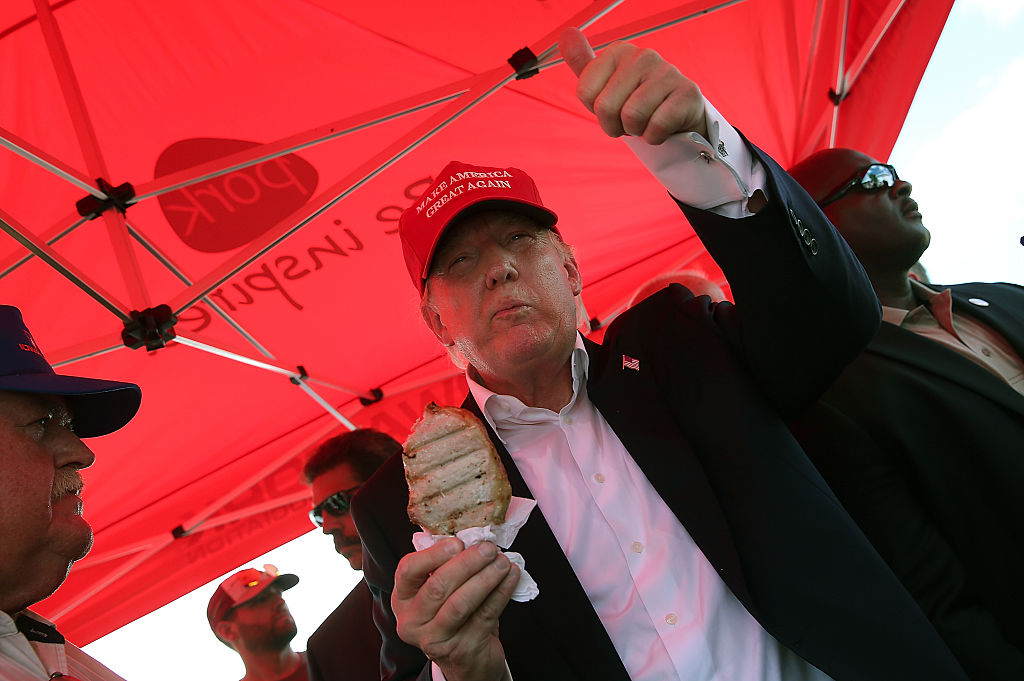Trump's trade policies have left a void that's hurting American agriculture, boosting exports in rival nations


A free daily email with the biggest news stories of the day – and the best features from TheWeek.com
You are now subscribed
Your newsletter sign-up was successful
Congress is on its August break and President Trump's at a golf resort in New Jersey, but U.S. businesses are still grappling with the topsy-turvy first 200 days of Trump's presidency, yearning for a little predictability. "Corporate uncertainty about whether the Trump administration will be able to deliver on numerous promises — including tax cuts, health care, a China crackdown, and infrastructure — has forced many companies to put important hiring and investment decisions on hold," The Washington Post reports. But Trump's trade policies are causing perhaps the most unease.
Trump's stalled plan to impose tariffs on steel imports has the U.S. steel industry on tenterhooks, homebuilders are reeling from a spike in lumber prices they attribute to Trump's soft-lumber dispute with Canada, and American agricultural industry is upset that Trump pulled the U.S. out of the 12-member Trans-Pacific Partnership trade pact. "TPP was fantastic," Kent Bacus at the National Cattlemen's Beef Association tells The New York Times. "When you walk away from it without a meaningful alternative, that causes a lot of alarm in the beef industry." In Japan, for example, U.S. beef now faces 50 percent tariffs, versus 9 percent under TPP.
In a lenghty report in Politico, trade reporter Adam Behsudi looks at how Trump's withdrawal from TPP is roiling American agriculture, focusing on pork production in Wright County, Iowa. "For much of industrial America, the TPP was a suspect deal," he writes, but for the struggling agriculture sector, the trade pact among 12 nations representing 40 percent of the world's economy "was a lifeline." Ominously, he adds, "Trump's decision to withdraw from the pact also cleared the way for rival exporters," and they have wasted no time filling the void.
The Week
Escape your echo chamber. Get the facts behind the news, plus analysis from multiple perspectives.

Sign up for The Week's Free Newsletters
From our morning news briefing to a weekly Good News Newsletter, get the best of The Week delivered directly to your inbox.
From our morning news briefing to a weekly Good News Newsletter, get the best of The Week delivered directly to your inbox.
"A Politico analysis found that the 11 other TPP countries are now involved in a whopping 27 separate trade negotiations with each other, other major trading powers in the region like China, and massive blocs like the EU," Behsudi says, and the remaining TPP countries have made clear they plan to move ahead without Trump's America. Many of the most-affected agriculture counties voted for Trump, expecting him to have their back as they built up for the expected trade boom that won't come now. Trump favors bilateral trade deals, viewing them as more favorable to the U.S., but his international trade team is still be put together and formulating a trade policy. You can read more about Trump's trade moves and agriculture at Politico.
A free daily email with the biggest news stories of the day – and the best features from TheWeek.com
Peter has worked as a news and culture writer and editor at The Week since the site's launch in 2008. He covers politics, world affairs, religion and cultural currents. His journalism career began as a copy editor at a financial newswire and has included editorial positions at The New York Times Magazine, Facts on File, and Oregon State University.
-
 The environmental cost of GLP-1s
The environmental cost of GLP-1sThe explainer Producing the drugs is a dirty process
-
 Greenland’s capital becomes ground zero for the country’s diplomatic straits
Greenland’s capital becomes ground zero for the country’s diplomatic straitsIN THE SPOTLIGHT A flurry of new consular activity in Nuuk shows how important Greenland has become to Europeans’ anxiety about American imperialism
-
 ‘This is something that happens all too often’
‘This is something that happens all too often’Instant Opinion Opinion, comment and editorials of the day
-
 TikTok secures deal to remain in US
TikTok secures deal to remain in USSpeed Read ByteDance will form a US version of the popular video-sharing platform
-
 Unemployment rate ticks up amid fall job losses
Unemployment rate ticks up amid fall job lossesSpeed Read Data released by the Commerce Department indicates ‘one of the weakest American labor markets in years’
-
 US mints final penny after 232-year run
US mints final penny after 232-year runSpeed Read Production of the one-cent coin has ended
-
 Warner Bros. explores sale amid Paramount bids
Warner Bros. explores sale amid Paramount bidsSpeed Read The media giant, home to HBO and DC Studios, has received interest from multiple buying parties
-
 Gold tops $4K per ounce, signaling financial unease
Gold tops $4K per ounce, signaling financial uneaseSpeed Read Investors are worried about President Donald Trump’s trade war
-
 Electronic Arts to go private in record $55B deal
Electronic Arts to go private in record $55B dealspeed read The video game giant is behind ‘The Sims’ and ‘Madden NFL’
-
 New York court tosses Trump's $500M fraud fine
New York court tosses Trump's $500M fraud fineSpeed Read A divided appeals court threw out a hefty penalty against President Trump for fraudulently inflating his wealth
-
 Trump said to seek government stake in Intel
Trump said to seek government stake in IntelSpeed Read The president and Intel CEO Lip-Bu Tan reportedly discussed the proposal at a recent meeting
